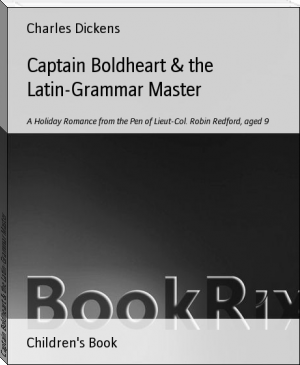Captain Boldheart & the Latin-Grammar Master - Charles Dickens (classic book list .TXT) 📗

- Author: Charles Dickens
Book online «Captain Boldheart & the Latin-Grammar Master - Charles Dickens (classic book list .TXT) 📗». Author Charles Dickens
FOREWORD
The story contained herein was written by Charles Dickens in 1867. It is the third of four stories entitled "Holiday Romance" and was published originally in a children's magazine in America. It purports to be written by a child aged nine. It was republished in England in "All the Year Round" in 1868. For this and four other Christmas pieces Dickens received L1,000.
"Holiday Romance" was published in book form by Messrs Chapman & Hall in 1874, with "Edwin Drood" and other stories.
For this reprint the text of the story as it appeared in "All the Year Round" has been followed.
CAPTAIN BOLDHEART AND THE LATIN-GRAMMAR MASTER
The subject of our present narrative would appear to have devoted himself to the Pirate profession at a comparatively early age. We find him in command of a splendid schooner of one hundred guns, loaded to the muzzle, 'ere yet he had had a party in honour of his tenth birthday.
It seems that our hero, considering himself spited by a Latin-Grammar-Master, demanded the satisfaction due from one man of honour to another. Not getting it, he privately withdrew his haughty spirit from such low company, bought a second-hand pocket-pistol, folded up some sandwiches in a paper bag, made a bottle of Spanish liquorice-water, and entered on a career of valour.
It were tedious to follow Boldheart (for such was his name) through the commencing stages of his history. Suffice it that we find him bearing the rank of Captain Boldheart, reclining in full uniform on a crimson hearth-rug spread out upon the quarter-deck of his schooner the Beauty, in the China Seas. It was a lovely evening, and as his crew lay grouped about him, he favoured them with the following melody:
O landsmen are folly!
O Pirates are jolly!
O Diddleum Dolly,
Di!
(_Chorus_) Heave yo.
The soothing effect of these animated sounds floating over the waters, as the common sailors united their rough voices to take up the rich tones of Boldheart, may be more easily conceived than described.
It was under these circumstances that the lookout at the masthead gave the word, "Whales!"
All was now activity.
"Where away?" cried Captain Boldheart, starting up.
"On the larboard bow, sir," replied the fellow at the masthead, touching his hat. For such was the height of discipline on board of the Beauty, that even at that height he was obliged to mind it or be shot through the head.
"This adventure belongs to me," said Boldheart. "Boy, my harpoon. Let no man follow;" and leaping alone into his boat, the captain rowed with admirable dexterity in the direction of the monster.
All was now excitement.
"He nears him!" said an elderly seaman, following the captain through his spy-glass.
"He strikes him!" said another seaman, a mere stripling, but also with a spy-glass.
"He tows him towards us!" said another seaman, a man in the full vigour of life, but also with a spy-glass.
In fact the captain was seen approaching, with the huge bulk following. We will not dwell on the deafening cries of "Boldheart! Boldheart!" with which he was received, when, carelessly leaping on the quarter-deck, he presented his prize to his men. They afterwards made two thousand four hundred and seventeen pound ten and sixpence by it.
Ordering the sails to be braced up, the captain now stood W.N.W. The Beauty flew rather than floated over the dark blue waters. Nothing particular occurred for a fortnight, except taking, with considerable slaughter, four Spanish galleons, and a Snow from South America, all richly laden. Inaction began to tell upon the spirits of the men. Captain Boldheart called all hands aft, and said:
"My lads, I hear there are discontented ones among ye. Let any such stand forth."
After some murmuring, in which the expressions, "Aye, aye, sir!" "Union Jack!" "Avast," "Starboard," "Port," "Bowsprit," and similar indications of a mutinous undercurrent, though subdued, were audible, Bill Boozey, captain of the foretop, came out from the rest. His form was that of a giant, but he quailed under the captain's eye.
"What are your wrongs?" said the captain.
"Why, d'ye see, Captain Boldheart," replied the towering mariner, "I've sailed man and boy for many a year, but I never yet know'd the milk served out for the ship's company's teas to be so sour as 'tis aboard this craft."
At this moment the thrilling cry, "Man overboard!" announced to the astonished crew that Boozey, in stepping back, as the captain (in mere thoughtfulness) laid his hand upon the faithful pocket-pistol which he wore in his belt, had lost his balance, and was struggling with the foaming tide.
All was now stupefaction.
But, with Captain Boldheart, to throw off his uniform coat regardless of the various rich orders with which it was decorated, and to plunge into the sea after the drowning giant, was the work of a moment. Maddening was the excitement when boats were lowered; intense the joy when the captain was seen holding up the drowning man with his teeth; deafening the cheering when both were restored to the main deck of the Beauty. And from the instant of his changing his wet clothes for dry ones, Captain Boldheart had no such devoted though humble friend as William Boozey.
Boldheart now pointed to the horizon, and called the attention of his crew to the taper spars of a ship lying snug in harbour under the guns of a fort.
"She shall be ours at sunrise," said he. "Serve out a double allowance of grog, and prepare for action."
All was now preparation.
When morning dawned after a sleepless night, it was seen that the stranger was crowding on all sail to come out of the harbour and offer battle. As the two ships came nearer to each other, the stranger fired a gun and hoisted Roman colours. Boldheart then perceived her to be the Latin-Grammar-Master's bark. Such indeed she was, and had been tacking about the world in unavailing pursuit, from the time of his first taking to a roving life.
Boldheart now addressed his men, promising to blow them up if he should feel convinced that their reputation required it, and giving orders that the Latin-Grammar-Master should be taken alive. He then dismissed them to their quarters, and the fight began with a broadside from The Beauty. She then veered round, and poured in another. The Scorpion (so was the bark of the Latin-Grammar-Master appropriately called) was not slow to return her fire, and a terrific cannonading ensued, in which the guns of The Beauty did tremendous execution.
The Latin-Grammar-Master was seen upon the poop, in the midst of the smoke and fire, encouraging his men. To do him justice, he was no Craven, though his white hat, his short grey trousers, and his long snuff-coloured surtout reaching to his heels--the self-same coat in which he had spited Boldheart--contrasted most unfavourably with the brilliant uniform of the latter. At this moment Boldheart, seizing a pike and putting himself at the head of his men, gave the word to board.
A desperate conflict ensued in the hammock nettings--or somewhere in about that direction--until the Latin-Grammar-Master, having all his masts gone, his hull and rigging shot through and through, and seeing Boldheart slashing a path towards him, hauled down his flag himself, gave up his sword to Boldheart, and asked for quarter. Scarce had he been put into the captain's boat, 'ere The Scorpion went down with all on board.
On Captain Boldheart's now assembling his men, a circumstance occurred. He found it necessary with one blow of his cutlass to kill the Cook, who, having lost his brother in the late action, was making at the Latin-Grammar-Master in an infuriated state, intent on his destruction with a carving-knife.
Captain Boldheart then turned to the Latin-Grammar-Master, severely reproaching him with his perfidy, and put it to his crew what they considered that a master who spited a boy deserved?
They answered with one voice, "Death."
"It may be so," said the Captain; "but it shall never be said that Boldheart stained his hour of triumph with the blood of his enemy. Prepare the cutter."
The cutter was immediately prepared.
"Without taking your life," said the Captain, "I must yet for ever deprive you of the power of spiting other boys. I shall turn you adrift in this boat. You will find in her two oars, a compass, a bottle of rum, a small cask of water, a piece of pork, a bag of biscuit, and my Latin grammar. Go! and spite the natives, if you can find any."
Deeply conscious of this bitter sarcasm, the unhappy wretch was put into the cutter, and was soon left far behind. He made no effort to row, but was seen lying on his back with his legs up, when last made out by the ship's telescopes.
A stiff breeze now beginning to blow, Captain Boldheart gave orders to keep her S.S.W., easing her a little during the night by falling off a point or two W. by W., or even by W.S., if she complained much. He then retired for the night, having in truth much need of repose. In addition to the fatigues he had undergone, this brave officer had received sixteen wounds in the engagement, but had not mentioned it.
In the morning a white squall came on, and was succeeded by other squalls of various colours. It thundered and lightened heavily for six weeks. Hurricanes then set in for two months. Waterspouts and tornadoes followed. The oldest sailor on board--and he was a very old one--had never seen such weather. The Beauty lost all idea where she was, and the carpenter reported six feet two of water in the hold. Everybody fell senseless at the pumps every day.
Provisions now ran very low. Our hero put the crew on short allowance, and put himself on shorter allowance than any man in the ship. But his spirit kept him fat. In this extremity, the gratitude of Boozey, the captain of the foretop whom our readers may remember, was truly affecting. The loving though lowly William repeatedly requested to be killed, and preserved for the captain's table.
We now approach a change in affairs.
One day during a gleam of sunshine and when the weather had moderated, the man at the masthead--too weak now to touch his hat, besides its having been blown away--called out,
"Savages!"
All was now expectation.
Presently fifteen hundred canoes, each paddled by twenty savages, were seen advancing in excellent order. They were a light green colour (the Savages were), and sang, with great energy, the following strain:
Choo a choo a choo tooth.
Muntch, muntch. Nycey!
Choo a choo a choo tooth.
Muntch, muntch. Nyce!
As the shades of night were by this time closing in, these expressions were supposed to embody this simple people's views of the Evening Hymn. But it too soon appeared that the song was a translation of "For what we are going to receive," &c.
The chief, imposingly decorated with feathers of lively colours, and having the majestic appearance of a fighting Parrot, no sooner understood (he understood English perfectly) that the ship was The Beauty, Captain Boldheart, than he fell upon his face on the deck, and





Comments (0)